Part 147: Lesson 2: The Unconscious: It's Just There
-Specialist-
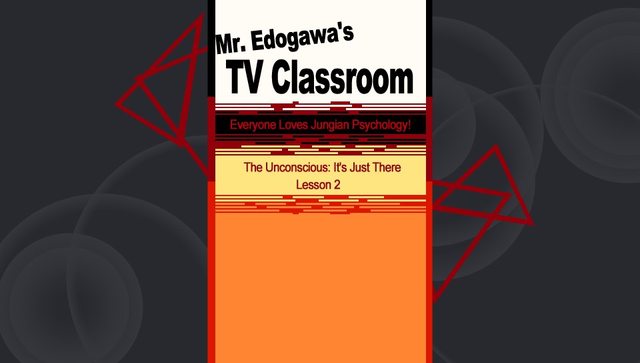
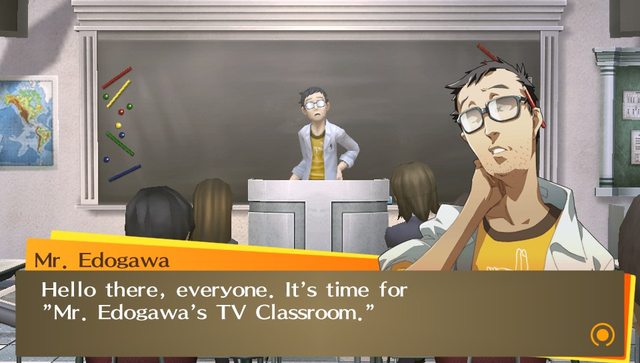

"Everyone Loves Jungian Psychology!" An invitation to the you that you don't know. Today is installment #2..."The Unconscious: It's Just There." Do you remember the last lecture? You're not already just glossing over it, are you? Eeeheehee. Now, let's begin the class. Siras, Etar, Besanar...
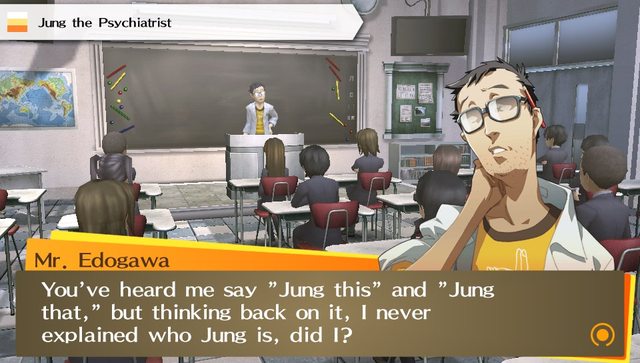

So this time, I'll give you some biographical details throughout the lesson. Carl Jung was born in Switzerland in 1875. By the turn of the century, he had begun his career as a psychiatrist. He became a doctor who counseled people with mental illnesses. At the time, psychiatry was still in the very early stages of development...But there was one effective method of treatment known at the time. That method was hypnosis.
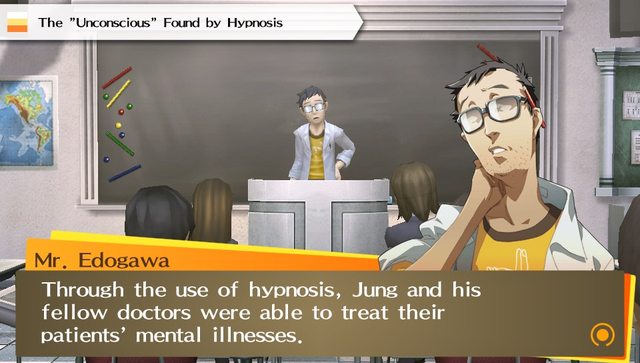

While under hypnosis, the patients displayed sides of themselves that had never been seen, as well as alternate personalities...So where did these hidden sides and other personalities come from? That became the question du jour. "Where are they hiding!?" essentially. If man could be aware of all the aspects of his mind, there should be nowhere to hide...But as it happened, there was. The conclusion that the psychiatrists came to was that there existed an area of the mind that people are not aware of. That is, of course, the unconscious, the opposite of the conscious. And that is how doctors like Jung first discovered the existence of the unconscious in those days. I'm sure many of you know, but the one who contributed the most to the discovery of the unconscious was Sigmund Freud. Freud could be considered Jung's mentor, but unfortunately, we don't have much time in these lessons to discuss their relationship. The unconscious was discovered by a group of extraordinary men. For now, just remember that fact. Now, let me ask you...when you think of the unconscious, how do you feel?

It's scary.
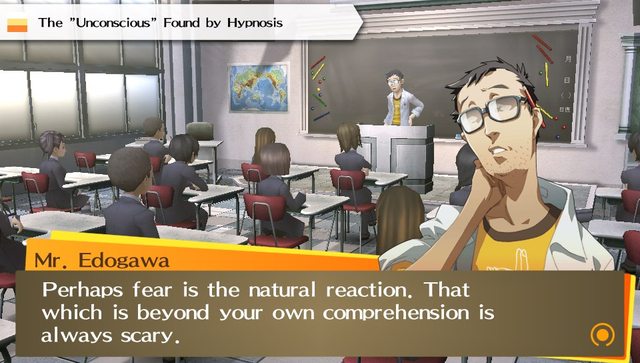

It's like that in general. But perhaps your feelings about the unconscious will change after these lectures? If you tell me it's there, I feel vaguely like it is...But in daily life, it's hard to believe, because you can't sense it. However, Jung and the others claimed that you can detect the unconscious in your daily life, even without hypnosis. One way is through "slips." Clinically known as parapraxes, things like a slip of the tongue or forgetting to do things fall into this category. You've been in situations where you accidentally called someone, such as your teacher, "Mommy," right? What you meant to say was "Ms. Saeko," but something else slipped out. The unconscious is closer than you thought. Another way to detected the unconscious is in dreams. That's easy to see, no? Typically, one dreams of things that are not possible in the real world. You may have surprised yourself before with dreams of things you've never experienced, haven't you? They really were beyond your imagination, weren't they? Something your conscious mind could never have come up with. Yes, dreams are quite close to the unconscious. Dreams are an important part of study in Jungian psychology. We'll go over that in another lecture.
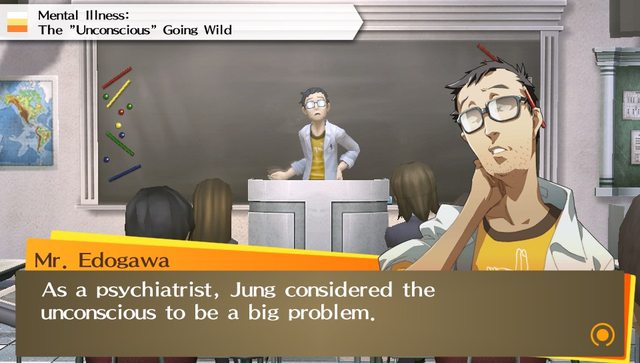

Why? Because he considered it to be the cause of mental illness. This is how he saw things...In a healthy mind, the conscious was in control, reining in the unconscious. But for his mentally ill patients, the unconscious broke free of its reins and ran amok.
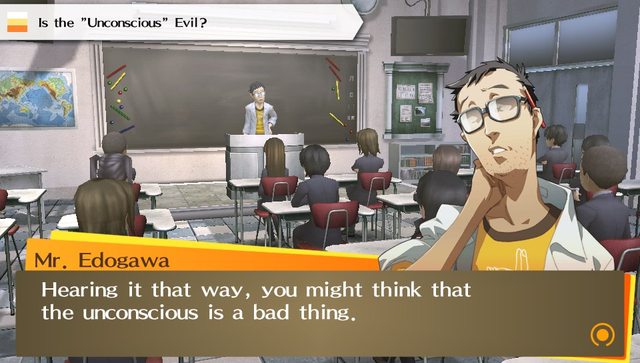

But that's not quite how Jung saw it. An uncontrolled unconscious taking over is a bad thing, yes...but the unconscious itself is not innately bad! What led him to say this, you might ask? His observations as a psychiatrist led him to realize that the cause of mental illness was actually on the conscious side. When you suppress your emotions too tightly, or work too hard, or stress yourself to your limit...the unconscious makes its move. Essentially, when the conscious mind becomes overtaxed and unbalanced, the unconscious mind comes out as if to stop it. The unconscious compensates for the conscious when the latter overextends itself. Seen this way, the unconscious definitely seems like something you'd want to have. Its role is to balance the mind.
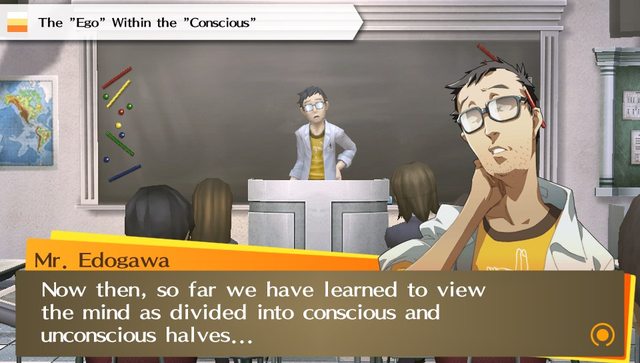

Next, let's talk about "you."
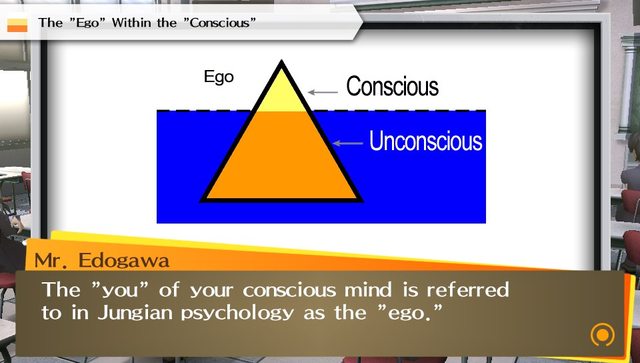

This, too, is now a common term, which makes things complicated...But for purposes of this lecture, when I say "ego," it will carry the Jungian meaning. The ego is the center of the conscious and in most respects "is" the mind. But it is only "you" in the conscious sense. The domain of the ego does not extend into the unconscious. This will be a key point later on in our studies of Jungian psychology.
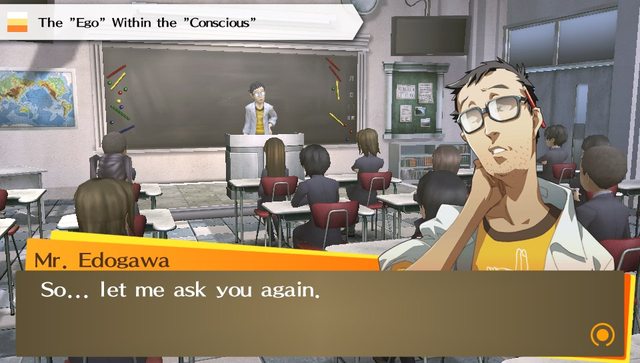

When you think of the unconscious, how do you feel?

Mad respect.
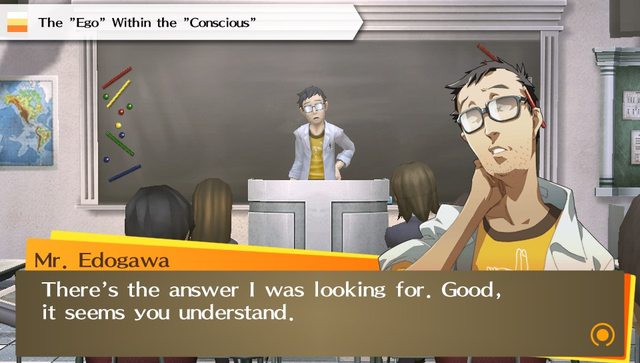

You can't understand the mind's true form without knowing and respecting the unconscious. Essentially, we are residents of the conscious, so our thinking is biased toward it. We take the conceited view that we are the masters of our own minds. When in truth, the mind is nothing but a tiny conscious working on the support of the unconscious' massive energies. If you forget that...I'm sure you see now. Well then, our time is up. Next time, I'll cover the amazing disposition of the mind, as advocated by Jung. So ends today's lesson.


 "Everyone Loves Jungian Psychology!" An invitation to the you that you don't know. Today is installment #2..."The Unconscious: It's Just There." Do you remember the last lecture? You're not already just glossing over it, are you? Eeeheehee. Now, let's begin the class. Siras, Etar, Besanar...
"Everyone Loves Jungian Psychology!" An invitation to the you that you don't know. Today is installment #2..."The Unconscious: It's Just There." Do you remember the last lecture? You're not already just glossing over it, are you? Eeeheehee. Now, let's begin the class. Siras, Etar, Besanar...
 So this time, I'll give you some biographical details throughout the lesson. Carl Jung was born in Switzerland in 1875. By the turn of the century, he had begun his career as a psychiatrist. He became a doctor who counseled people with mental illnesses. At the time, psychiatry was still in the very early stages of development...But there was one effective method of treatment known at the time. That method was hypnosis.
So this time, I'll give you some biographical details throughout the lesson. Carl Jung was born in Switzerland in 1875. By the turn of the century, he had begun his career as a psychiatrist. He became a doctor who counseled people with mental illnesses. At the time, psychiatry was still in the very early stages of development...But there was one effective method of treatment known at the time. That method was hypnosis.
 While under hypnosis, the patients displayed sides of themselves that had never been seen, as well as alternate personalities...So where did these hidden sides and other personalities come from? That became the question du jour. "Where are they hiding!?" essentially. If man could be aware of all the aspects of his mind, there should be nowhere to hide...But as it happened, there was. The conclusion that the psychiatrists came to was that there existed an area of the mind that people are not aware of. That is, of course, the unconscious, the opposite of the conscious. And that is how doctors like Jung first discovered the existence of the unconscious in those days. I'm sure many of you know, but the one who contributed the most to the discovery of the unconscious was Sigmund Freud. Freud could be considered Jung's mentor, but unfortunately, we don't have much time in these lessons to discuss their relationship. The unconscious was discovered by a group of extraordinary men. For now, just remember that fact. Now, let me ask you...when you think of the unconscious, how do you feel?
While under hypnosis, the patients displayed sides of themselves that had never been seen, as well as alternate personalities...So where did these hidden sides and other personalities come from? That became the question du jour. "Where are they hiding!?" essentially. If man could be aware of all the aspects of his mind, there should be nowhere to hide...But as it happened, there was. The conclusion that the psychiatrists came to was that there existed an area of the mind that people are not aware of. That is, of course, the unconscious, the opposite of the conscious. And that is how doctors like Jung first discovered the existence of the unconscious in those days. I'm sure many of you know, but the one who contributed the most to the discovery of the unconscious was Sigmund Freud. Freud could be considered Jung's mentor, but unfortunately, we don't have much time in these lessons to discuss their relationship. The unconscious was discovered by a group of extraordinary men. For now, just remember that fact. Now, let me ask you...when you think of the unconscious, how do you feel? It's scary.
It's scary.
 It's like that in general. But perhaps your feelings about the unconscious will change after these lectures? If you tell me it's there, I feel vaguely like it is...But in daily life, it's hard to believe, because you can't sense it. However, Jung and the others claimed that you can detect the unconscious in your daily life, even without hypnosis. One way is through "slips." Clinically known as parapraxes, things like a slip of the tongue or forgetting to do things fall into this category. You've been in situations where you accidentally called someone, such as your teacher, "Mommy," right? What you meant to say was "Ms. Saeko," but something else slipped out. The unconscious is closer than you thought. Another way to detected the unconscious is in dreams. That's easy to see, no? Typically, one dreams of things that are not possible in the real world. You may have surprised yourself before with dreams of things you've never experienced, haven't you? They really were beyond your imagination, weren't they? Something your conscious mind could never have come up with. Yes, dreams are quite close to the unconscious. Dreams are an important part of study in Jungian psychology. We'll go over that in another lecture.
It's like that in general. But perhaps your feelings about the unconscious will change after these lectures? If you tell me it's there, I feel vaguely like it is...But in daily life, it's hard to believe, because you can't sense it. However, Jung and the others claimed that you can detect the unconscious in your daily life, even without hypnosis. One way is through "slips." Clinically known as parapraxes, things like a slip of the tongue or forgetting to do things fall into this category. You've been in situations where you accidentally called someone, such as your teacher, "Mommy," right? What you meant to say was "Ms. Saeko," but something else slipped out. The unconscious is closer than you thought. Another way to detected the unconscious is in dreams. That's easy to see, no? Typically, one dreams of things that are not possible in the real world. You may have surprised yourself before with dreams of things you've never experienced, haven't you? They really were beyond your imagination, weren't they? Something your conscious mind could never have come up with. Yes, dreams are quite close to the unconscious. Dreams are an important part of study in Jungian psychology. We'll go over that in another lecture.
 Why? Because he considered it to be the cause of mental illness. This is how he saw things...In a healthy mind, the conscious was in control, reining in the unconscious. But for his mentally ill patients, the unconscious broke free of its reins and ran amok.
Why? Because he considered it to be the cause of mental illness. This is how he saw things...In a healthy mind, the conscious was in control, reining in the unconscious. But for his mentally ill patients, the unconscious broke free of its reins and ran amok.
 But that's not quite how Jung saw it. An uncontrolled unconscious taking over is a bad thing, yes...but the unconscious itself is not innately bad! What led him to say this, you might ask? His observations as a psychiatrist led him to realize that the cause of mental illness was actually on the conscious side. When you suppress your emotions too tightly, or work too hard, or stress yourself to your limit...the unconscious makes its move. Essentially, when the conscious mind becomes overtaxed and unbalanced, the unconscious mind comes out as if to stop it. The unconscious compensates for the conscious when the latter overextends itself. Seen this way, the unconscious definitely seems like something you'd want to have. Its role is to balance the mind.
But that's not quite how Jung saw it. An uncontrolled unconscious taking over is a bad thing, yes...but the unconscious itself is not innately bad! What led him to say this, you might ask? His observations as a psychiatrist led him to realize that the cause of mental illness was actually on the conscious side. When you suppress your emotions too tightly, or work too hard, or stress yourself to your limit...the unconscious makes its move. Essentially, when the conscious mind becomes overtaxed and unbalanced, the unconscious mind comes out as if to stop it. The unconscious compensates for the conscious when the latter overextends itself. Seen this way, the unconscious definitely seems like something you'd want to have. Its role is to balance the mind.
 Next, let's talk about "you."
Next, let's talk about "you."
 This, too, is now a common term, which makes things complicated...But for purposes of this lecture, when I say "ego," it will carry the Jungian meaning. The ego is the center of the conscious and in most respects "is" the mind. But it is only "you" in the conscious sense. The domain of the ego does not extend into the unconscious. This will be a key point later on in our studies of Jungian psychology.
This, too, is now a common term, which makes things complicated...But for purposes of this lecture, when I say "ego," it will carry the Jungian meaning. The ego is the center of the conscious and in most respects "is" the mind. But it is only "you" in the conscious sense. The domain of the ego does not extend into the unconscious. This will be a key point later on in our studies of Jungian psychology.
 When you think of the unconscious, how do you feel?
When you think of the unconscious, how do you feel? Mad respect.
Mad respect.
 You can't understand the mind's true form without knowing and respecting the unconscious. Essentially, we are residents of the conscious, so our thinking is biased toward it. We take the conceited view that we are the masters of our own minds. When in truth, the mind is nothing but a tiny conscious working on the support of the unconscious' massive energies. If you forget that...I'm sure you see now. Well then, our time is up. Next time, I'll cover the amazing disposition of the mind, as advocated by Jung. So ends today's lesson.
You can't understand the mind's true form without knowing and respecting the unconscious. Essentially, we are residents of the conscious, so our thinking is biased toward it. We take the conceited view that we are the masters of our own minds. When in truth, the mind is nothing but a tiny conscious working on the support of the unconscious' massive energies. If you forget that...I'm sure you see now. Well then, our time is up. Next time, I'll cover the amazing disposition of the mind, as advocated by Jung. So ends today's lesson.